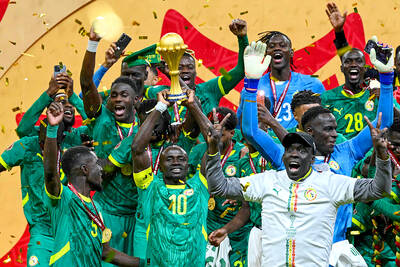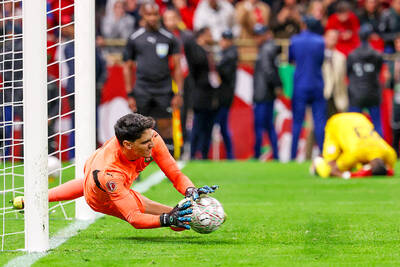Twenty-five years after her collision with Zola Budd left her sprawling on the Los Angeles Olympics track, Mary Slaney still wonders if the race that came to define her could have had a different outcome.
“All I know is that I ran the race unlike any other time I raced,” the US’ greatest middle-distance runner told reporters on a recent sunny morning.
Typically a front-runner, Slaney — then Mary Decker — said she followed her coach’s advice when she let others lead a portion of the 3,000m final many believed would bring her the ultimate prize of an Olympic gold medal.
“And that’s what I did,” said the 50-year-old Slaney, reflecting on the moments before she became entangled with the barefoot-running Budd and tumbled into the infield, injured, while the race continued without her.
Her coach, Dick Brown, told a news conference the next day that he and Decker, who was already world champion, had planned to let the South African-born, British-vested Budd lead, if she wanted, until the final lap. Their concern, he said, was not Budd, but eventual winner Maricica Puica of Romania.
“I am thinking the Olympics are so important, maybe I should listen to the coach,” said Slaney, who paced early portions of the race.
Although she no longer replays the Aug. 10 race in her head, she admitted: “If I had to go back and say: ‘Oh, are there any regrets?’ ... Well, the big regret is that I didn’t run the way I normally would have run.”
At the time, Slaney blamed Budd’s inexperience for the collision, even though Olympic officials cleared the teenager of fault.
Slaney, who had undergone several operations because of problems with her legs, had been denied the chance to compete in the 1980 Moscow Olympics because of the US-led boycott.
Heavily criticized in 1984 for her reaction towards Budd, Slaney still feels the pain of what happened.
“How is someone in their early 20s that’s been training and trying to get to the Olympics since they were 10, and it happens to be on US soil ...” she began before trailing off with: “And oh, my God.”
She said, though, that her reaction might have been different if she had been older at the time.
“You can’t change it,” said Slaney, who turns 51 on Aug. 4. “You don’t know if it would be any different if it happened now ... [but] I think as you get older, you are able to control things a little more with yourself.”
She and Budd participated in several events over the years that followed, but “there is really not a relationship,” the American said.
“It’s not like I knew her before or really had the opportunity to know her after. It’s just history,” she said. “It’s a part of the sport, part of what happened.”
The two exchanged letters for a year.
“We both wished people would just leave it alone and let us get on with running,” Slaney said. “But that was not going to happen.”
After all, as Slaney asked rhetorically: “How many Americans do you think remember the American that should have won that was lying on the track?”
The moment fixed Slaney’s image in the eyes of the US public. It also inspired her.
“In 1985 I just wanted every single time that I stepped on the track to prove that I was the best,” Slaney said.
She had done so at the 1983 world championships, boldly winning both the women’s 1,500m and 3,000m, and in 1985 she conquered the world again.
“That was a satisfying feeling to run the entire season being undefeated, run against everybody from the Olympics, essentially run all my fastest times except the 1,500 ... break the world record in the mile and win the overall grand prix,” she said.
She never won an Olympic medal, though.
Eighth in the 1,500m and 10th in the 3,000m at the 1988 Seoul Olympics, Slaney missed making the 1992 US team by one spot in the 1,500m and failed to advance to the 5,000m finals at the 1996 Atlanta Games.
Even more upsetting was a controversial doping test at the 1996 US Olympic trials that showed her ratio of testosterone to epitestosterone was higher than international rules allowed.
Slaney and her lawyers contended the test was unreliable for women taking birth control pills but the sport’s international governing body, now the International Association of Athletics Federations (IAAF), temporarily suspended her in June 1997. US officials reinstated her after a hearing but an IAAF arbitration panel ruled in 1999 that she had committed a doping offense.
“It was an attack on my character, an attack on my entire running career,” Slaney said. “I just felt like someone ripped my heart out.”
Along with 17 official and unofficial world records, Slaney once held the American record for every distance from 800m to 10,000m. Five US records are still hers.
“I helped with the progression of female running, female sports in this country, which gives me a large amount of satisfaction,” she said. “But at the same time, I felt there was so much more ... with all the injuries, all the surgeries and everything else. I feel like I would have liked more chances.”

MARRED FINAL: As most of Senegalese players walked off the pitch after a controversial decision, some supporters threw objects and attempted to get onto the pitch Senegal on Sunday won the Africa Cup of Nations (AFCON) as Pape Gueye’s extra-time winner sunk hosts Morocco 1-0 after a chaotic final that saw the eventual champions storm off the pitch late in the game. Brahim Diaz could have won the trophy for Morocco with a controversial spot-kick in the 24th minute of added time at the end of normal time as ugly scenes broke out in the stands. However, Senegal goalkeeper Edouard Mendy easily saved the weak attempted “Panenka” chip by the Real Madrid winger, who was clearly distracted by the long delay that followed the penalty award.

James Harden on Friday scored 31 points and came up big in overtime to help the Los Angeles Clippers erase a double-digit deficit on the way to a 121-117 NBA victory over the Toronto Raptors. Harden scored 16 points in the fourth quarter and overtime as the Clippers pushed their wining steak to five games despite the absence of star Kawhi Leonard with a sprained right ankle. The Clippers trailed by 11 entering the fourth quarter, but Harden drilled a pair of free-throws with 1:24 left in regulation to tie it and after misses from both teams, they went to

Dallas Mavericks rookie Cooper Flagg on Wednesday was ruled out for the second half of their 118-109 loss to the Denver Nuggets after the No. 1 pick sprained his left ankle in the first half. Flagg was called for a foul while defending against Peyton Watson and turned the ankle as he fell to the floor with 6 minutes, 1 second left in the second quarter. Flagg limped to the bench and continued to the locker room, but returned for the final 2 minutes, 35 seconds before the break. The 19-year-old did not come out for the second half before the announcement that

Yassine Bounou on Wednesday saved two penalties, while Youssef en-Nesyri netted the decisive spot-kick as hosts Morocco secured a 4-2 shoot-out victory over Nigeria following a 0-0 draw in a tense Africa Cup of Nations semi-final in Rabat. Morocco, seeking their first continental title in 50 years, are to face 2021 winners Senegal in Sunday’s decider in Rabat, while Nigeria take on Egypt in the third-place playoff tomorrow. The 120 minutes before the shoot-out had few clear-cut chances for either side, but it was Morocco who created more opportunities, although they were denied by some fine saves from Nigeria goalkeeper Stanley Nwabali. Nigeria